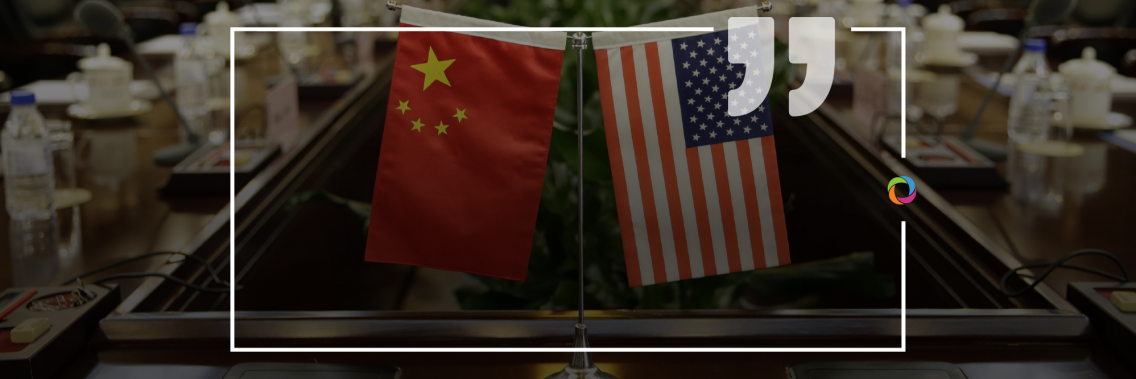Throughout much of the Cold War, international development was always an important arena for superpower competition. The current tensions between the US and China appear to be a contest for global preeminence or power. Could these relations affect the efforts of global development? Let’s see what experts have to say about this.
How are US-China tensions changing the game for global trade?

“US-China tensions cover the full range of mutual differences as well as dependencies. Be it currency exchange rate, plummeting prices for steel, high tech competition, security concerns or tariffs, the ideological differences are very much coloring the interpretation of disputes and tensions. Compared to Cold War logic, these tensions are much more subtle. It is a fact that China emerged from the hard-core version of Maoist socialism to a kind of mish-mash hard core capitalism led by communists. I remember being there in 1985 during the humble beginnings of this experiment, and nowadays it is hard to recognize a single bit of China. And that is only in 35 years. It created strong market dependencies, especially for the US in the Pacific basin. It is not only about trade, it is about China’s ability to engineer almost any manufacturing production and compete in almost every field with the rest of the world. To conclude, I may say that China poses a challenge and a threat at the same time for one simple reason. Nobody really knows what is going on and what the future will bring in a logical way. China’s low regulated capitalism paradigm attracts investments and technology transfer, strong growth and the development of all varieties of technologies and yet nobody can predict whether it will become a key factor for undermining the communist party’s monopoly in politics. It is apparent that, as far as we can observe, with regard to the tensions (and topics thereof) there is no US or even EU unified policy to determine priorities and have a firm long-term approach, be it in strengthening their own economies, or to diversify trade and tech transfer beyond China.”

“Although US-China tensions seem to have produced more harm than good, it has certainly built new challenges and opportunities for some countries such as Vietnam, often mentioned as one of the countries to most benefit. The emergence of a new actor should not be limited to one particular country but be extended to the region and taken as a chance for regional growth (e.g. Southeast Asia) since many companies may relocate manufacturing from China to other countries of the region to avoid tariffs. Furthermore, there is growing expectation of a more proactive role from the European Union in the world economy. Finally, the appearance of new regions in a so far bi-polar system exclusively led by the United States and China will hopefully bring more equilibrium to the global economic scene. The challenge for emerging actors now is to adjust and secure their position in a new system where geopolitics is more than ever implicated.”

“In the multipolar world order, the tensions between China and the US and their consequences are far more tangible in global trade and politics, but relatively less perceivable in the international development field. As China has a global role as a crucial trade partner, almost every country in the world is interested in a relationship with the Chinese market. In this sense, the pressure applied by the US – in order to impose limits on China – is leaving European, Latin American and Asian countries at a crossroads. The so called “trade war” has a worldwide effect considering that the production of goods and services is highly dislocated. The tariff feud can certainly distort the trade flows for third countries.”
How could US-China tensions hamper development efforts?

“It is quite obvious that tensions will hamper development efforts. China is an active protagonist of development assistance in some parts of the world. Africa is becoming a battleground and several Chinese initiatives like the Silk Road, investments in ports of Europe, soft loans in Western Balkans open new questions and issues. While the US and EU model of development assistance addresses institutional and regulatory framework building for all development recipients, China is not preoccupied with regulations. And that is exactly what is creating the problem, since most of the recipients of development assistance and aid are not particularly keen on institution building and to a various extent incline towards non-conditional assistance. The reason for this comes from populist or simply totalitarian and corrupt politics (or softer versions of it) in various parts of the developing world. As I live and work in Western Balkans, I may say that this region began the battle a decade ago and China is gaining reasonable ground. In almost every case, the outcomes of such arrangements are in conflict with either EU or US policies. US or EU tensions with China will continue in various forms and it is not a major problem, as it is matter of competition between big nations. The developing world will suffer more as competing strategies tend to support political opposites. It would be wise to test whether UN institutions have enough authority to discuss Chinese alienation from the very UN principles when development goals and policies are in question.”

“When elephants fight, it is the grass that suffers. This Kenyan proverb comes as an apposite illustration to depict the consequences that many developing countries are suffering due to ongoing US-China tensions. As a matter of fact, in an interdependent global economy, tensions between the two super powers pose a threat to global economic growth far beyond national boundaries and the sectors targeted. Thus, on a larger scale, the US-China trade war would cause detrimental effects to development efforts and sustainable development projects such as education, climate change and renewable energy. What we have to worry about the most is that development will degenerate into a tool of ideological competition between the two powers. Development should not be used as a tool of soft power competition to broaden zones of influences. This would only hamper its progress. A call for international institutions to prevent developing countries becoming victims of geopolitical tensions is urgently needed.”

“In the realm of international development, the US and China clearly operate on different stages. While the US has a long tradition of channeling aid for development around the world – in the hands of USAID – China has no ambition of replacing the US as a “global development funder”. China’s interests are not exactly related to the “American model” of funding actions that promote peace, human rights, the environment or justice. Instead, China utilizes South-South Cooperation as an instrument to canalize large infrastructure projects – investments – that in one way or another provide them with access to natural resources/raw materials. China’s ultimate goal is to strengthen the One Belt, One Road Initiative.”
Check out more than 500 job opportunities related to international relations here.

